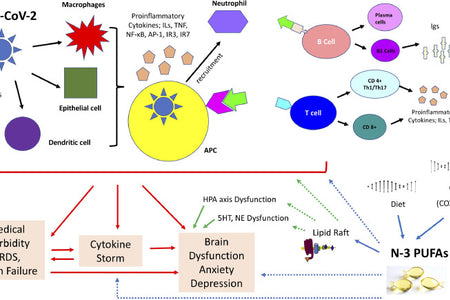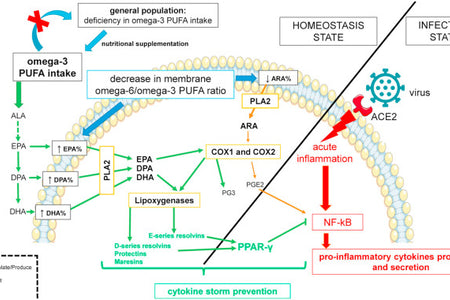
Vitamin D and Omega-3 Fatty Acid Intake in Men on Active Surveillance for Prostate Cancer
2021-06-21
Intensive nutritional intervention with Vitamin D and Omega-3 PUFA supplementation may benefit men on active surveillance for prostate cancer. Fifty-five out sixty-eight patients who were provided a nutritional intervention and vitamin supplementation underwent follow-up biopsy, all showing no progression of disease.

Nerve regeneration following 12-months of omega-3 nutrition therapy in patients with type 1 diabetes
2021-05-27
Participants with T1D took seal-oil (10 mL/day; 750 mg eicosapentaenoic acid (EPA), 560 mg docosapentaenoic acid (DPAn-3), and 1020 mg docosahexaenoic acid (DHA)) for 12-months in a single-arm open-label study. Twelve-months seal-oil therapy increased mean plasma EPA by 185%, DPA by 29%, DHA by 79% (p < 0.001) and CNFL by 29% (p = 0.001). In conclusion, low plasma DHA was associated with prevalent DSP, n-3 therapy increased blood n-3 levels and higher baseline n-3s were associated with greater nerve regeneration.

Omega-3 fatty acids in the psychological and physiological resilience against COVID-19
2021-02-16
Improving innate immunity has been suggested to block progression of COVID-19 at early stages, while omega-3 polyunsaturated fatty acids (n-3 PUFAs) have been shown to have immunomodulation effects. Moreover, n-3 PUFAs have also been shown to improve mood disorders.

May omega-3 fatty acid dietary supplementation help reduce severe complications in Covid-19 patients?
2021-01-18
Omega-3 long-chain polyunsaturated fatty acids (omega-3 LC-PUFAs) could help improve the resolution of the inflammatory balance, limiting therefore the level and duration of the critical inflammatory period. Omega-3 LC-PUFAs may also interact at different stages of the viral infection, notably on the virus entry and replication.

Different metabolism of EPA, DPA and DHA in humans: A double-blind cross-over study
2020-11-30
The findings showed that DPA as a reservoir could be metabolized into DHA, and further retro-conversed back to EPA. Supplementation with EPA was efficiently incorporated into plasma lipid fractions, whereas incorporation of DHA into plasma lipid fractions was limited within a short period of supplement.

Effect of omega-3 supplementation on neuropathy in type 1 diabetes - A 12-month pilot trial
2020-10-28
12 months of seal oil omega-3 polyunsaturated fatty acids (v-3 PUFA) supplementation will stop the known progression of diabetic sensorimotor polyneuropathy (DSP) in type 1 diabetes mellitus (T1DM).

Association between Obesity and Omega-3 Status in Healthy Young Women
2020-10-01
Omega-3 polyunsaturated fatty acids (n-3 PUFAs) are essential for healthy development and protect against metabolic disease. However, individuals with obesity may be pre-disposed to experiencing lower n-3 PUFA status than normal-weight individuals.

Omega-3 Fatty Acid Supplementation Linked to Reduced Inflammation and Flaring in Lupus
2020-09-04
Preclinical and clinical studies reveal that consumption of the marine ω-3 highly unsaturated fatty acids (HUFAs) eicosapentaenoic acid (EPA) and docosahexaenoic acid (DHA) might be used as a precision nutrition intervention to lessen lupus symptoms.

Higher levels of omega-3s are associated with lower risk of suboptimal sleep
2020-08-04
Research: participant ages ranged from 35 to 96 years from 5 countries (Finland, Iceland, Sweden, Singapore, and the United States) with higher circulating omega-3 FAs had a lower risk of suboptimal sleep.
